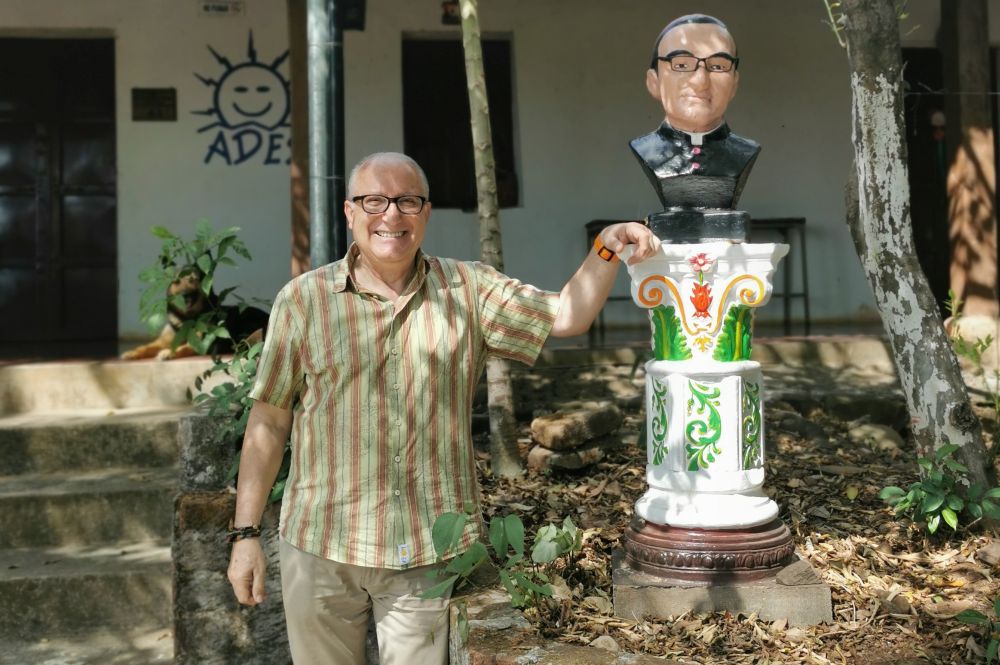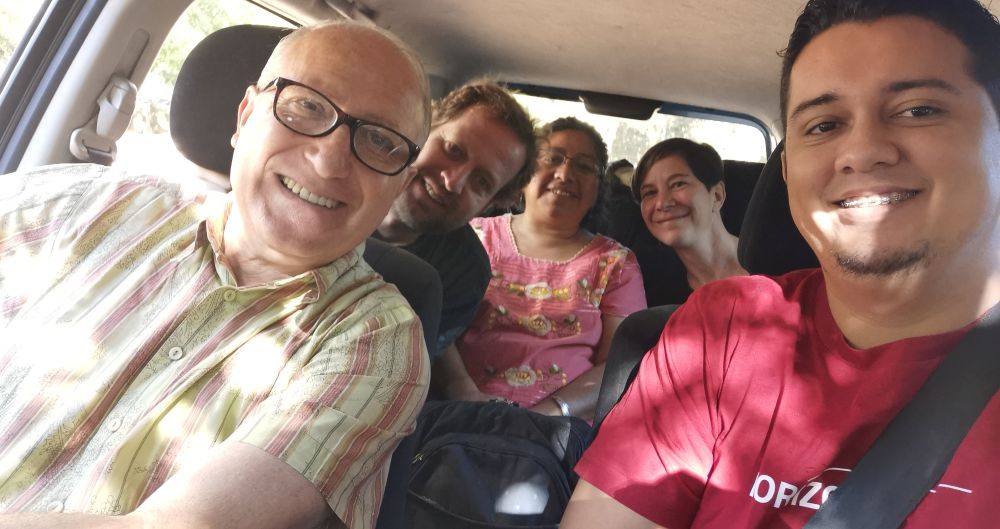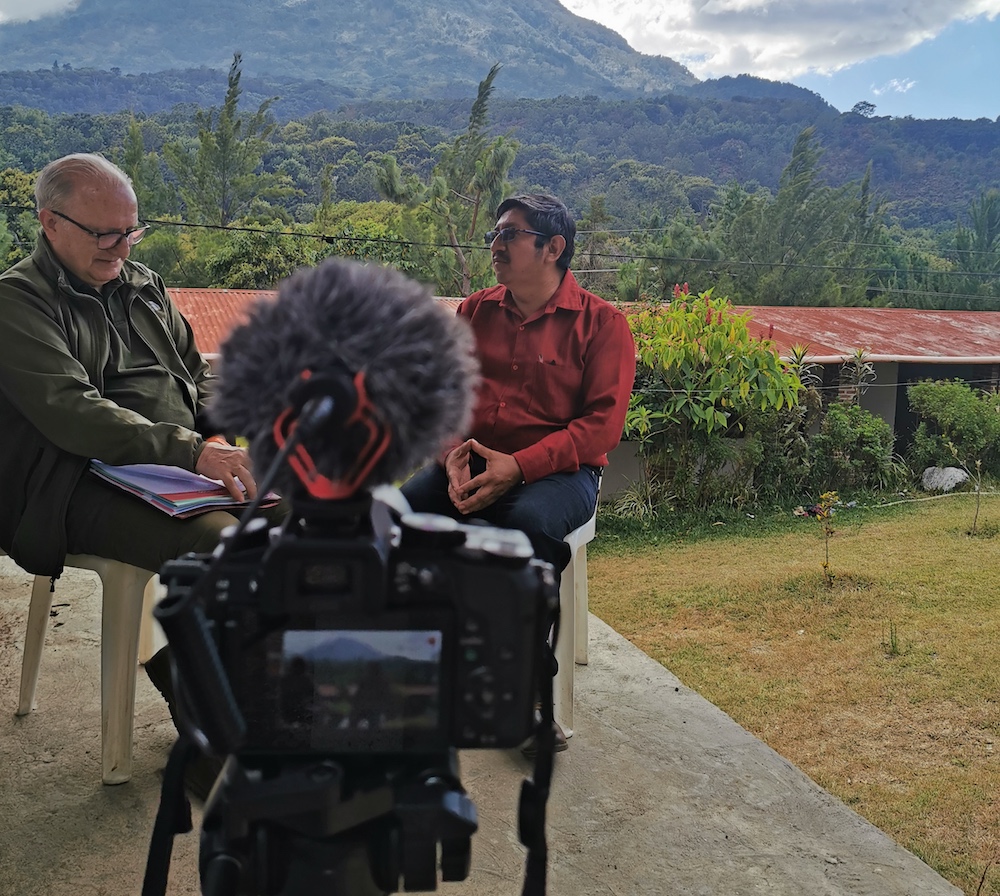Make Your Experiences Count. They Can Change the World.
LET’S BRING ALL OF OUR KNOWLEDGE AND EXPERIENCES TOGETHER.
TOGETHER WE KNOW MORE. TOGETHER WE ACHIEVE MORE. TOGETHER WE DO BETTER.
LET’S BRING ALL OF OUR KNOWLEDGE AND EXPERIENCES TOGETHER.
TOGETHER WE KNOW MORE. TOGETHER WE ACHIEVE MORE. TOGETHER WE DO BETTER.
Published: November 2, 2020
In the midst of one meeting after the other and the thorough handover process of the Programme Coordination of the Central American Region to his successor Kristina Kroyer, Diego Santos-Santiago managed to take the time to have a chat with me, answer some questions and paint a picture of the current situation in Central America regarding our two main sectors of work: Rural Development and Natural Resource Management and the strengthening of Civil Society and Human Rights.

While we talk, I can notice that it might be one of the last interviews that Diego will give in his position of Regional Programme Coorindator, since he seems very considerate of highlighting all of the aspects he find’s relevant to mention and of not forgetting any of the messages he still wants to communicate before retiring. I can sense that this position was not just a job function, but a personal conviction for him.
That’s the reason, why his last trip with HORIZONT3000 to Central America was very important to him as well. It was a very productive journey, resulting among other things in various videos that we will include in this article in order to give you a better idea of the developments Diego brings up.

I start off the interview with a question about the current situation, most recent events as well as developments and perspectives in terms of the Civil Society in Central America. I’ll try to sum up the detailed analysis that Diego outlines in the following paragraphs:
The Region of Central America is facing very critical circumstances in its current development. Its society is fighting against the social and economic inequality and the lack of access to a decent living. For his analysis he emphasizes three big groups, which at the same time make up the target groups of the programmes and projects that HORIZONT3000 supports.
On the one hand, there is the peasant family as the core of the social and productive organisation that fell victim to the wrong developments, the plundering of their land and the macro-projects of mining, energy, transport and communication, water etc. with the resulting socio-environmental unrest between communities and the State. This situation is especially meaningful in Guatemala – a country that unfortunately still shows very racist traits and that his home to a large indigenous population, which forms the greatest part of peasantry.
On the other hand, the group of women and girls has to be highlighted. The high levels of poverty, inequality and social violence that characterise the region of Central America affects women (and even more so indigenous and women of color) stronger as a consequence of less opportunities to access information, means of production and jobs of quality as well as inferior salaries and higher unemployment rates. This situation results in a diverging of the gap of social and gender inequality and at the same time it provokes the highest rates of femicide in Latin America.
Finally, the groups of teens and youth are very significant in terms of their participation in the economic as well as the the social development of their societies and countries. It is no secret that the current development does not benefit them. While facing a lack of access to education, to job alternatives as well as to opportunities of a decent living, they look for alternative solutions. This is a task that comes along with many barriers. Sometimes it leads to internal or external migration, sometimes to a solution in the family or community and sometimes the solution seems to be to join a gang and/or enter illegal businesses.
Consequently, many young people find themselves in a spiral of crime. Drug trafficking for instance already appears as one of the structural issues when analysing these countries. What stands out here is the missing answer from the states – failed states that do not even aim at providing justice, security, education, health etc. for the people. At the end of the past century the services of these states were reduced under the label of the market, which led to a huge amount of unattended social spaces.
That’s the reason why, the population is looking for ways to organise themselves with the objective of finding an answer to these circumstances. “The level of development of these local initiatives allows organisations like ours that some of the projects that we support succeed”, emphasizes Diego before he goes on with a retrospective of some of the origins of the organised Civil Society: “Part of the Civil Society in Central America comes from revolutionary processes with all of its advantages and disadvantages and its members are not accepting the fact that their lives are that poor, that insecure, that doomed, so to speak. They are simply not willing to agree with it, which is why they organise themselves in order to change it.”
This is how the base of many NGOs in Central America was built and it is where the International Cooperation plays a significant role. Expecting the current governments to improve the living conditions of the groups we work with in Central America is delusional. “Our target group, our partner in the cooperation is the Civil Society,” Diego afirms and adds, “This is where we work – in the rural area and the natural resource management as well as in the area of women and youth rights.”
We have found a wide range of Organisations in Civil Society; organisations that have taken the brave decision of fighting for their rights. They include women, youth and peasant family and community organisations. Diego assures us: “I can confidently state that together we have accepted the challenges there are – and there are many – and we identifiy with THEIR proposal of initiative for THEIR development. We are in charge of providing the technology, the funding and some of our experience, but it is the organised Civil Society itself who carries out the work, who makes sure that we succeed and who makes the empowerment of our programmes and projects possible.”
Over time, the Civil Society has reached high levels of specialization – for instance when it comes to the work of fighting violence against women, the holistic education of new leaderships or improving access to justice for women and youth. “The Civil Society carries more and more weight in the International Cooperation. For instance: For several years now, the European Union supports projects of the organised Civil Society in a technical and financial way regarding their work of “social comptroller and audits”. That is something that in former times was claimed from the Civil Society, but without providing the means to carry out this highly important task for the democratic health of societies in Central America. For HORIZONT3000 it is a great satisfaction to have been able to support various of these projects.”
Diego maintains that we can be optimistic that this process of the Civil Society will have positive effects on the development in these countries. Nevertheless he expresses his doubts: “On a personal level I am not that sure that the Civil Society will reach the expected success, because the scope of action is very critical: The gap between rich and poor is growing and the amount of authoritarian, populist governments is increasing in failed states with the pollution of social – or rather antisocial – media and the desperate massive mass migrations. For the countries it would pose a huge wasted opportunity, if the Civil Society could not carry out its mission.”

The situation, however, is not lost yet. In the midst of it all young people represent hope. That’s the reason why, it is even more important for them to have alternatives, because otherwise they will migrate to the north. The hope lies in them continuing the work that the previous generation of Civil Society has already achieved. For instance among the engaged youth the gender topic already forms part of their life and belongs to their professional education’s curriculum. They have managed to create an environment in which diversity is seen as a strength. They have outgrown the initial phase of sensitization in terms of gender roles. Now, they are putting into practice and defining new gender roles and healthy forms of, for instance, masculinity.
„They are very clear, very dedicated organisations, in which the experienced women – who where part of the revolutionary processes – show the younger generations how to be a feminist. Their spirit is impressive.”
The same is true for the peasant communities and families, who play a fundamental role in the rural development and the natural resource managment in Central America. They face poverty situations provoked mostly by cases of the “Climate Catastrophe” – as Diego calls the phenomenon of climate change, “since it is not a “natural change”, but a catastrophe that represents a direct consequence of the selfishness and the predominant greed as well as the unsustainable exploitation of our planet’s resources”. In this area the concept of agroecology has brought possible alternatives and niche to the picture, where our support of peasant communities can lead to a compensation regarding natural resources. The various concepts of agroecology teach us how to find solutions to improve the living conditions of peasant families.
It was never a priority to us to support commercilization for external markets, not even fair traid. We have prioritized the expectations of the beneficiaries and we have achieved certain impact on this level: reducing the use of agrochemicals and hybrid seeds and/or any genetically modified input, as well as the auto-production of inputs, compost, organic sanitizers and everything necessary in order to produce. Besides, we focus on diversification wherever possible. Poverty leads to an absurd and desperate concentration of monocultures. We aspire to facilitate better access to proteins and vitamins and thereby improve food security in general.
„We are very interested in promoting these advantages in the entire region and in order to do that we endorse barter and the local market of organic products. In this sense it is crucial to keep in mind that families in the neighbourhood of the organic producer can not pay more for a clean product than for a chemical one. The people we work with simply can’t. The good thing is that they do not have to anymore, since – although it is true that agroecology requires a lot of dedication – a lot of the producers have already achieved reducing their production costs by creating their own inputs and stopping to buy chemicals. Besides, by focusing on local markets they avoid transportation costs and intermediaries – “coyotes” – who exploit them.
In this last trip an organic farmer confirmed, as I had already known, that his neighbours do not pay him more for his clean product. Nevertheless, while he is selling all of his organic products within the first hours of the local market, other farmers with conventional chemical products take a lot more time to sell them – sometimes they almost have to give them away for free in the afternoon so that they don’t have to return home with them again. So he is done early with selling his products and walks home with a calm mind, since he doesn’t have to worry that due to his products people will get poisoned.”
The proposal includes breaking the established consumption circles – not only for the local market, but also for other areas like the hospitality industry, the gastronomy at local fairs and traditional markets etc. At the moment, the funds for taking measures in this direction are still missing, but it is a perspective for the future.
While goverments and the international capital are promoting the exploitation of natural resources, the destruction of the environment, the displacement of thousands of communities, the appropriation of water and forestes etc. our Partner Organisations in Central America together with us and the communities want to support and foster the defense of territory. “It’s another aspect where we work to defend these persons who are now criminialized and called terrorists.”
After having discussed the importance of the Civil Society in Central America and promising concepts for the natural resource management and the rural development, I ask Diego whether he would like to add something that I didn’t ask him. Read on to get to know his answer:
„I want to emphasize what Central America means to Europe and to us.
HORIZONT3000 and the Member Organisations of its Managing Board maintain a determined cooperation in the three countries of the region. DKA-Austria and KFB are supporting the work of HORIZONT3000 in the three countries, SFLinz in Nicaragua, BSIN-Innsbruck in El Salvador and WH-Graz in Guatemala.
Besides, the European Union is the main donour in the International Cooperation and during the current seven-year period there was a 30% increase of funding. This increase was interpreted as proof of satisfaction with the work, despite of all the problems there are as well. In 2021 the next seven-year period starts, which will last until 2027.
We consider that Civil Society in Central America still deserves the support from the European Union’s Civil Society as well as the countries’ governments, from the Member Organisations of the Managing Board of HORIZONT3000, from the ADA and the European foundations. The Austrian Civil Society can’t count on the guaranteed future support from its government in terms of its initiatives regarding the International Cooperations with the Central American Civil Scoiety. Let’s join forces to make it possible and show the people in Central America that we stand with them.”
In order to conclude, Diego gives the floor to Cardinal Ramazzini: